DKT Car Driver Knowledge Test – General Knowledge 1
Check all that apply. You should use your right-hand indicator when:
Get in the habit of using your indicator every time you make a manoeuvre as it tells other drivers what your intentions are.
You have a six year old child with you in your car. You have just parked so you can collect a prescription from the chemist. You should:
Leaving a child in the car is dangerous for a number of reasons. The child may play with the controls, inadvertently releasing the handbrake, for example, or in summer it may suffer heat exhaustion or dehydration.
Check all that apply. You want to leave your automatic car parked on a street sloping uphill. You should:
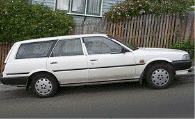
You can also turn your wheels towards the kerb for added security as if the car rolls it will turn itself towards the kerb.
Can a P1 or P2 provisional driver legally instruct a learner driver?
P1 and P2 drivers are not yet experienced enough behind the wheel. To take the driving test for a P1 licence you must be at least 17 years old, have logged at least 120 hours of driving time (including at least 20 hours at night), and have held your licence for at least 12 months. You have to hold a P1 licence for at least 12 months before you can attempt the Hazard Perception Test in order to proceed to your P2 licence. A P2 licence must be held a minimum of 24 months before a full licence can be issued.
As you leave a freeway, which of the following should you check?
Travelling at freeway speeds is deceptive. If you are coming to an intersection, roundabout or zone with a lower speed limit, begin to slow down early and adjust your speed appropriately.
Your car registration expires today. You have your car inspected for registration renewal but it fails the inspection. What should you do?
It is an offence to drive an unregistered vehicle on the road.
Generally, if you hear the siren of an emergency vehicle you should:
Pulling over to the left will give the emergency vehicle as much space as possible to overtake you. Don't brake heavily or you risk the emergency vehicle running into the back of your vehicle, or another vehicle behind you running into you.
Advertisement
Do you have any responsibilities when opening a vehicle door on a roadway?
Opening a vehicle door presents a significant danger to cyclists, as well as other vehicle users. Always check your mirrors and over your shoulder before opening your door.
Which vehicle is parked correctly?
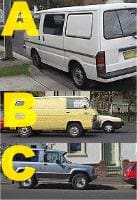
Vehicle A is parked over a driveway and vehicle B is double-parked.
If an oncoming vehicle crosses the centre line and is coming straight at you and you cannot stop, you should:
The more speed you can scrub off, and the further you are to your left, the more chance you have of avoiding an accident, or at least minimising its effects. You should never swerve to the other side of the road as there might be other traffic coming towards you, and the other driver may regain control and move back to the correct side of the road.
You are approaching an intersection that has a red light camera. The lights turn yellow when you are too close to stop safely. The lights go red as you get to the other side of the intersection. Will you receive a penalty notice?
The camera is triggered by a vehicle entering the intersection when the lights have turned red.
When there are three lanes on a freeway:
To ensure the best traffic flow, only use the right hand lane and middle lane for overtaking. Hogging the right hand lane causes frustration for other drivers
When displaying L or P plates, how much of the letter must be clearly visible?
They must be displayed on the front and back of the exterior of the vehicle and not be obscured.
If your vehicle is involved in an accident (regardless of the damage), what details must you give, to the other driver(s), if asked?
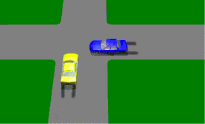
This ensures that all parties have the correct information for insurance purposes.
Advertisement
What must you do if you miss your exit on a freeway?
You should exit the freeway at the next appropriate exit and make your way back to your desired exit on the other side of the freeway. Reversing on the freeway is dangerous and prohibited.
Where must L or P plates be displayed on a vehicle:
They must be displayed on the front and back of the exterior of the vehicle and not be obscured.
When reversing, you should:
Reversing presents dangers as it's more difficult to control and stop the vehicle. Braking distances can be increased when reversing because your rear brakes aren't as powerful.
When merging onto the freeway from the entrance, you should:
Trying to merge into freeway traffic too slowly causes a dangerous situation for other drivers who may have to brake heavily. Match your speed and merge into a gap in the traffic. Stopping at the end of the merging lane is extremely dangerous as then you could be doing 100km/h less than other traffic and trying to merge from there will be extremely dangerous for you and other drivers.
You borrow a friend's car and find that the position of the driver's seat puts you sitting a long way from the steering wheel and controls. What should you do?
Do not drive a car if you can't reach the pedals and steering wheel comfortable as it makes it much harder to control.
Which side mirror is adjusted best?
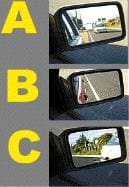
Mirror A allows you to see back up the lane as far as possible and minimises (but doesn't eliminate) your blind spot.
Where there is parallel kerbside parking, are you allowed to double-park alongside a parked vehicle?
Double parking obstructs the road way and causes a hazard for other road users.
Advertisement
You are driving on a freeway and realise you forgot something at home. You want to go back for it. Can you do a U-turn on this road?
If you need to go back, leave the freeway at the next appropriate exit.
If you are driving through a road work zone in the left hand lane and you see this sign you should:
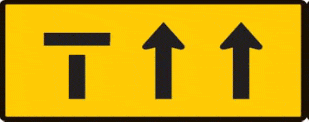
The left lane is closed. Merge like a zip (alternate vehicles) into the right hand lane
If you see a sign indicating road repairs are going on, you should:
Road repairs can cause the road to be slippery, and you may come around a corner to find a traffic controller with a handheld sign directing traffic, therefore be prepared to stop.
You drive up to a corner where you see some loose gravel on the road. You should
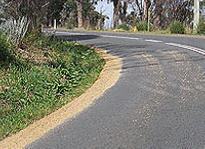
Gravel has much less grip and it is easier for you to lose control when you are going faster.
Before driving on a freeway, which of the following should you do?
Stopping on a freeway is more dangerous, even though there is an emergency lane. There is unlikely to be anywhere you can address these problems and you will create an unnecessary hazard if you have a preventable issue with your vehicle. It is important to have the correct tyre pressure because freeway speeds are high and incorrect tyre pressure can affect handling and increase the risk of a tyre blowout.
Before getting out of your vehicle you must
Opening a vehicle door presents a significant danger to cyclists, as well as other vehicle users. Always check your mirrors and over your shoulder before opening your door.
A friend lends you his car. It is very noisy and blows a lot of smoke. He tells you the vehicle has been given a defect notice but it's still OK to drive it. What should you do?
A defect notice will be issued for a failed inspection and a vehicle will not pass a subsequent inspection until the necessary repairs specified on the defect notice have been fixed. In the case of a minor defect notice there will be a time period specified in which the defects must be fixed. For a major defect, the vehicle might be grounded (prevented from driving on the road).
Advertisement
Where there are double dividing lines, you may park:
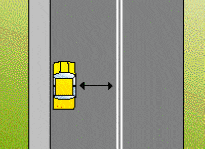
At least three metres is required to allow other vehicles to safely pass without crossing the double dividing lines.
If you break down on a freeway, you should
The emergency lane is the safest place to be. Park as far left as you can and, if it's not safe to get out of the driver's side, get out of the passenger's side.